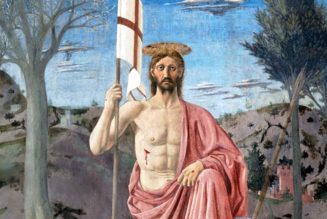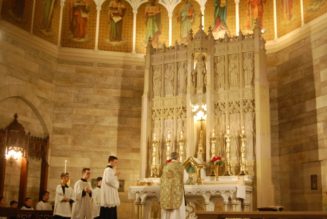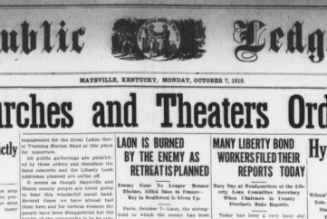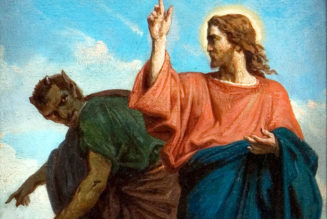 One evening when was a teenager, I was alone at my uncle and aunt’s home in Illinois experiencing a particular temptation. Knowing the direction where things were headed, I prayed to God for some kind of diversion, saying, “Lord, give me something.” The next moment, as I scanned the living room bookshelves, I saw a paperback book. Its red cover shows the faceless silhouette of a horned demon dressed in formal attire, a suit, beneath the book’s famous title: “The Screwtape Letters” by C.S. Lewis. That night God delivered me from temptation through what would go on to become one of my all-time favorite novels.
One evening when was a teenager, I was alone at my uncle and aunt’s home in Illinois experiencing a particular temptation. Knowing the direction where things were headed, I prayed to God for some kind of diversion, saying, “Lord, give me something.” The next moment, as I scanned the living room bookshelves, I saw a paperback book. Its red cover shows the faceless silhouette of a horned demon dressed in formal attire, a suit, beneath the book’s famous title: “The Screwtape Letters” by C.S. Lewis. That night God delivered me from temptation through what would go on to become one of my all-time favorite novels.
In it, we read the letters of a senior demon named Screwtape to a junior demon, his “nephew” Wormwood. Screwtape instructs Wormwood in spiritual and psychological techniques for misleading human beings, describing how to draw the soul of one’s target (called the “patient”) away from God (called “the Enemy“) and toward the devil (called “Our Father Below”). The book is really wonderful, seasoned with dry, ironic humor and containing great insights into human nature and spiritual realities. In one passage, Screwtape reflects upon the use of pleasure in tempting souls:
“I know we have won many a soul through pleasure. All the same, it is His [God’s] invention, not ours. He made the pleasures: all our research so far has not enabled us to produce one. All we can do is to encourage the humans to take the pleasures which our Enemy has produced, at times, or in ways, or in degrees, which He has forbidden. … An ever increasing craving for an ever diminishing pleasure is the formula. … To get the man’s soul and give him nothing in return — that is what really gladdens our [Father the devil’s] heart.”
Indeed the demons and every sin always take good things and corrupt, distort, or misuse them.
Reflect upon fire for a moment. Is fire a good thing or is it bad? St. Francis of Assisi, in his poetic hymn “The Canticle of the Creatures,” praises God for his creation of fire:
“Be praised, my Lord, through Brother Fire,
through whom You brighten the night.
He is beautiful and cheerful, and powerful and strong.”
Fire gives light, it offers heat, and it dances with a fascinating beauty. If fire were evil, would the Holy Spirit have descended in the likeness of tongues of fire at Pentecost? Yet fire, though God’s good creation, can be misused, at wrong times or wrong places or for wrong reasons, causing great suffering, destruction, and even death. Whenever we sin (be it through lying, stealing, lust, greed, gluttony, or whatever) we take some good thing God has given and set it aflame. Our misdeeds may yield heat and light for awhile, serving some purpose we find useful, but when they burn out we are left with ashes.
Do you know where the ashes we use on Ash Wednesday come from? Customarily, they are the ashes of burnt palms used on previous Palm Sundays. Like the people of Jerusalem on Palm Sunday who waved palms and sang “Hosannas” for Jesus and then went on to crucify him, so our sins are major or minor denials or rejections of Christ.
There’s another famous book about temptation and sin I’d like to mention that’s by an author named Oscar Wilde, who himself lived a sinful life but repented on his deathbed and died a Catholic. In “The Picture of Dorian Gray” a very handsome, very wealthy young man sits to have his portrait painted and offers his soul in exchange for the wish that his portrait would age instead of himself. The wish is granted and as the years pass by the picture of Dorian Gray ages while his own youthful appearance remains unchanged. However, as he lives a wicked, selfish life, the state of his sinful soul is reflected by the increasingly hideous portrait which Dorian keeps secretly hidden and covered up in his attic. Are not most of our unrepeated sins like this? Unseen by others yet marked on our souls and clearly visible to God who sees what is hidden. We have played with fire, we have been burnt by it, and we are left with ashes.
In the Old Testament, God’s people put dirt or ashes upon their heads as a sign of repentance. In the Book of Nehemiah “the Israelites gathered together while fasting and wearing sackcloth, their heads covered with dust.” And the Book of Daniel records how the prophet “turned to the Lord God, to seek help, in prayer and petition, with fasting, sackcloth, and ashes.” This year, because of the pandemic, the Vatican has asked us to put on ashes in a way common in other Catholic countries but which is different from what we’re used to. Rather than marking our foreheads with a cross, the top of our heads will be sprinkled with ashes.
Even if no one else notices these ashes atop our heads today, they will outwardly symbolize the ugliness of our secret sins and the uncleanliness of our invisible souls, and appeal to our merciful God above who is able to make us clean. Repent and believe in the Gospel, discouraging the demons and delighting the angels. Make the most of Lent this year by confessing your sins and to drawing closer to the Lord and to that holy image of yourself which God envisions for you in Heaven.
Join Our Telegram Group : Salvation & Prosperity






![A ‘perfect’ chocolate chip cookie and the chef who created it [scroll to end of article for recipe]…](https://salvationprosperity.net/wp-content/uploads/2020/10/a-perfect-chocolate-chip-cookie-and-the-chef-who-created-it-scroll-to-end-of-article-for-recipe-327x219.jpg)

